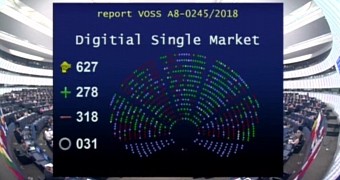A piece of legislation referred to as Article 13 that was supposed to regulate the use of copyright materials online, in Europe, has been rejected by the European Parliament after a relatively close vote.
The initial piece of legislation (also called a directive), was proposed all the way back in 2016 by the European Commision in an effort to complement the existing copyright law that dates from 2001.
Bringing the legislation up to date is not a bad idea, but the problem is that it creates major difficulties for pretty much every company that has online activity, not to mention that it would have generated massive costs for third-parties.
Basically, everyone starting from Google on down, including Facebook and Twitter, would need to have automatic filters that would stop people from infringing upon protected content. It would also mean that linking to other websites or quoting them would become impossible or it would require paying taxes.
Voting will return on Article 13
The current version of the legislation was opposed by numerous companies and people from around the world, including Google, Twitter, Wikimedia, Mozilla, and many others. On the other hand, lots of prolific artists were in favor of the proposition as it would greatly increase their revenues.
The modifications were voted today in the European Parliament, and they were rejected, with 318 votes against, 278 in favor, and 21 abstained. It was a close call, but it doesn't mean that it's going away. The copyright law still needs to be amended, but a new version won't return for a vote until September 10th.
The immense pressure from the people of the European Union, and from outside as well, made all the difference. In fact, the image that was created for this piece of legislation, that of Internet censorship, was probably the determining factor for the rejection.
Details about who and how they voted will soon be available online.

 14 DAY TRIAL //
14 DAY TRIAL //